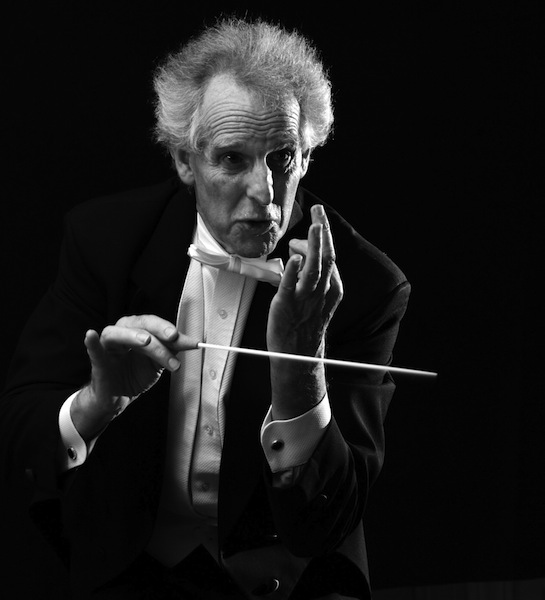Zander, Boston Philharmonic celebrate with Ginastera, Ravel and Strauss
The Boston Philharmonic put itself through the wringer Thursday night at Sanders Theatre and had a great time doing it.
Under Benjamin Zander’s lively direction, orchestral works showcasing every part of the orchestra didn’t give anyone a chance to catch their breath onstage or off. Even Zander joked about “three pieces only a foolish person would put together.”
Alberto Ginastera’s Variaciones concertantes opened the concert with twelve bold, moody sections challenging each of the principals. Composed in the second of Ginastera’s three creative periods, this concerto for orchestra is one of his more tonally centered works, with themes and rhythms based on the music of Ginastera’s native Argentina. Clarinetist Rane Moore performed some of the most difficult music written for her instrument with a bright tone and danceable phrasing. Violist Lisa Suslowicz followed with a passionate modal variation. Oboist Catherine Weinfeld-Zell and bassoonist Lisa Chisholm turned their canonic variations into a warm pas de deux, with Zander slowly slipping the orchestra underneath them.
Throughout the concert, Zander’s direction combined attention to detail with grand, well-defined gestures. The string interludes in the Variaciones told brief stories between soloists and provided sharp accents alongside them. Zander also spoke about the music between pieces and conducted excerpts with the excitement of someone playing these works for the first time.
He introduced Ravel’s Suite No. 2 from Daphnis et Chloé by demonstrating its “gorgeous” harmonies and describing the work as a having “a different kind of virtuosity.” The second suite is taken from the last part of Ravel’s 1912 ballet, the titular lovers’ reunion and celebration.
The brilliant orchestration and narrative nuances keep musicians on their own toes. The opening bars immediately showed Zander’s knack for achieving a fulsome but transparent sound. “Daybreak” envelops the listener in lush harmonies but the Philharmonic’s balance kept the orchestration from turning into mere cushioning. Voicings embraced rather than merely filled in under the lead. Flutist Lisa Hennessy’s solo in the “Pantomime” impressed with its strong projection, subtle shading and sheer seductive power. Zander shaped an intense “Bacchanale” finale that still savored Ravel’s score.
After intermission, Zander ran the six-part gamut of Richard Strauss’s Ein Heldenleben, “The Hero’s Life.” He then gleefully described his template: a recording of Strauss himself conducting the work in a comparatively speedy 38 minutes. Most contemporary performances run closer to 49 minutes, but Zander said he decided to risk the Straussian interpretation on Thursday night (and apparently may not repeat it in future concerts).
The brisk recurring motif at the start of the first section, “The Hero,” portrayed a strong as well as spry hero. Strauss’s dense contrapuntal phrases remained lucid. In the second section, “The Hero’s Adversaries” really chattered and sniped: The Boston Philharmonic woodwinds were brave enough to sound nasal and cluttered, painting music critics hostile to Strauss with real humor and disgust.
At the other end of the textural and emotional spectrum, Strauss’s beloved wife, Pauline de Ahna, is depicted in a graceful violin cadenza for “The Hero’s Companion.” The evening’s concertmaster Matthew Vera reminded all with his glistening tone and dramatic phrasing that his subject was, in real life, an opera singer. Vera introduced her as a gentle voice against her husband’s critics, rendered with an attentiveness that would have pleased the famously demanding de Ahna. Vera’s precise staccato also conveyed her well-known prickly side.
The percussion let loose in “The Hero At Battle” alongside the brass, resounding with heft and bite here and throughout the program. Once again the orchestra sacrificed purity of tone to create a convincing cacophony. Zander’s brisk tempo made the more lyrical asides that much more plaintive. “The Hero’s Works of Peace” came across as a calmer but still energetic chapter. Harp, bassoon, cello and English horn created an especially bucolic atmosphere here. Strauss’s use of roughly thirty quotations from previous works also seemed like a good-natured round of “Name That Tune” for some audience members.
For the concluding “Hero’s Retirement,” Zander pulled back and let the music speak for itself with simple, beautiful melody. More frenzied outbursts quickly faded away into a closing dialogue for violin and French horn, with the conductor “peeling away” the winds into a final, organ-like chord.
Zander is a big personality with an even bigger affection for this music as well as his band. He opened the concert by noting both the 40th anniversary of the Boston Philharmonic and his own 80th birthday. In his view, birthdays are a time to have fun and challenge oneself, goals audibly accomplished that evening.
The program will be repeated 8 p.m. Saturday and 3 p.m. Sunday. bostonphil.org
Posted in Performances
